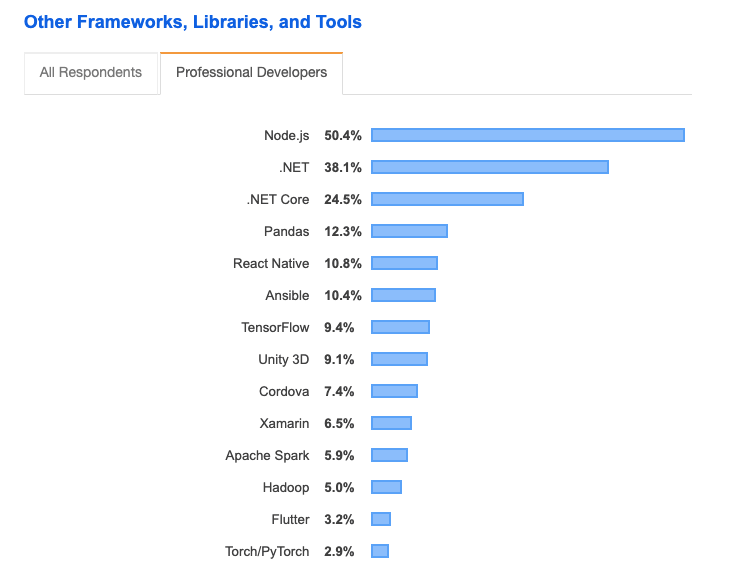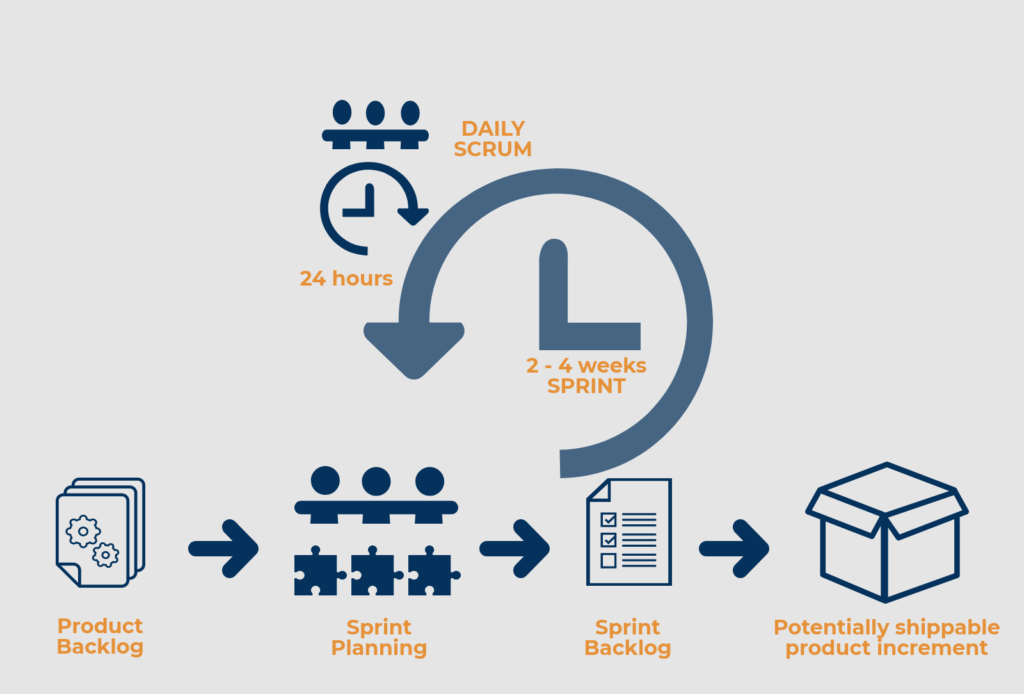Why choose Node.js?
Node.js was the most popular framework of 2019 according to StackOverflow, and it looks like this trend is here to stay.
No wonder! Success stories of companies such as PayPal (using Node.js helped them double the number of requests served per second, at the same time decreasing average response time by 35%) or Netflix (with the use of Node, the performance of the application improved and its startup time was reduced by 70%) seem to explain Node’s success.

What helps Node.js achieve such results?
On the technical side, there are two main factors that contribute to Node’s popularity:
- Node.js uses JavaScript (JS) engine. It means that both frontend and backend developers use the same ecosystem of tools, libraries, and package managers, which makes sharing code much easier. Moreover, utilizing JS on both client- and server-side makes the communication between them smoother, so your web application is faster and more efficient.
- Thanks to non-blocking I/O, Node applications are performant and scalable. Why? Because the application runs asynchronously and handles many tasks in one thread. If the app has to wait for data from another component, it puts the waiting line in a queue and handles a different task in the meantime, thus increasing efficiency and minimizing delays.
Besides, there is also a “fun factor”. As we can read in 2018 Node.js User Survey Report:
Node.js is continuing to have a positive impact on users particularly around developer productivity and satisfaction; when asked to describe Node.js, respondents use mostly positive terms like – “fast”, “easy”, “awesome”, “powerful”, “flexible” and even “fun”.
If you are curious about other reasons why companies choose to use Node.js, check out this article. And if you already know that Node.js is the right technology to build your web application, let’s see how to find the best Node.js developers.
Read more: Everything You Need to Know About Using Node.js for Back-End Development
How to choose the best Node.js development company?
The first step to choosing the best Node.js development company is proper research. The methodology is up to you! Talk to your network, use Clutch, Quora, go to some Facebook or LinkedIn groups, or simply google “best Node.js development services”. Easy, right? Now, you need to narrow your list down and contact a few companies that you choose. Here is how to do it.
Before you get in touch with a Node.js company

1. Specify your needs and budget
We already know that you need Node.js development experts. Any other requirements? Do you use any specific framework, like Nest.js or Express? What other technologies do you use? Even if you have a front-end part of the development covered by your internal team, some basic understanding of these technologies may be helpful and will improve the communication between the teams. Not to mention the scenario when you need some extra hands to deliver your web application on time.
Specifying your budget can be challenging too. First, note that a fixed-price contract is not the best choice for a web development project (learn more about different types of contracts for software development services in this article comparing fixed price vs. time & material), especially when building a new product. Why? Because taking the first step often unleashes many new ideas, so does confronting your idea with an experienced team, your market may change during the development, and when you show work-in-progress to your future customers, their opinions may differ from what you thought they would be. Under changing conditions, you need more flexibility.
So instead of asking different Node.js companies to estimate your project and choosing the cheapest offer, think about the budget that you have for this project now and see what can be achieved within this budget. Is it sufficient to build an MVP? Or would it be better to start with a prototype, validate the idea, and only then (when it’s validated on the market) invest more to build MVP?
2. Check their portfolio of Node.js development projects
You don’t need developers with 20 years of experience using Node.js – if that was even possible! Instead, focus on their portfolio and relevant tech expertise (frameworks, libraries, etc.). Read case studies and see if there is a match. Look for applications built with similar technologies, within your niche, or the ones that required overcoming challenges similar to the ones that you currently face. Read case studies and learn how the team approached the problem, how they solved it and what the outcome was.
Read also: What types of applications can you build with Node.js?
3. Read testimonials
When you buy a new phone, whose recommendation would you rather listen to, the one written by its producer or the one by its user? Web development services are not that different – at least when you think about the decision-making process.
Read the reviews of Node.js development companies that you consider to work with and learn what their assets and weaknesses are. In addition to what the companies present on their websites, try to search for testimonials collected by third-party organizations, such as Clutch. As they are not collected or posted by the reviewed company, they are not biased, thus they may be more trustworthy than the ones that don’t go through a similar process.
4. Check how they work
This point regards project management and communication – the two factors that may not be visible in the code but are crucial to your product’s success.
Let’s face it: outsourcing is usually less convenient than working with an in-house team. You need to manage the project remotely, and if there is a time-zone difference, it can make the process even more challenging. Luckily, there are some ways to mitigate these inconveniences. When choosing a Node.js development company to work with (or any other outsourcing company), make sure they apply these practices in their everyday work:
- Scrum
Scrum is an Agile framework for developing, delivering, and sustaining complex products. Developers work in Sprints which are time-boxes during which a potentially useful version of a working product is created. It helps you monitor the progress, assess the efficiency, but most importantly – establish a feedback loop at a very early stage of development and iterate before you get the product.

- PO Proxy
It’s not a very common solution but it can significantly boost the efficiency of a Scrum team! Traditionally, there are 3 roles in Scrum: Product Owner (that’s you), Scrum Master, and the Development team. The problem starts when the Product Owner is too busy to be involved in the process of development. This is when a PO Proxy should step in. A Product Owner Proxy is a middleman role between the person who is making decisions about a product and the people developing it. It’s the role of your representative within the vendor’s team. When searching for the best Node.js development company, check if they offer the role of PO Proxy. It is possible that you won’t need it at the current stage of your product development but if you do, it’s good to know that the company has experience working that way. - Direct access to the team
One of the biggest drawbacks of working with offshore Node.js developers is being far from them and all the implications of this fact. You may be afraid of communication friction and lack of control over the project. And it can get even more complicated if the only person you can talk to is a project manager who’s in charge of your project and you need to play Chinese whispers every time you want to share your feedback, ask a question or identify some problem. Direct access to the team – using Slack, Rocket.chat or another instant messenger – will really make it easier to manage the project on your side! - Communication plan
Communication is the factor which has a huge influence on a project’s performance and it is crucial to the success of the whole development. Any update regarding the product should be promptly reported to all people involved by providing regular, clear, and comprehensive information. It is also about your experience as a client – it makes it much easier to get on a project when you know what to expect in terms of communication during the development process.
A good communication plan should explain how you can follow product changes (using a project management tool), what meetings will take place regularly, what their purpose is, and which of them you should attend, what channels will be used for communication, and where the documents and project files will be stored. - Access to project files
It’s both about a feedback loop and other communication issues discussed in the points above and about your intellectual property. Make sure that you are the owner of the code and that you have access to project files such as the agreements, invoices, hourly reports, burndown charts, etc. during the whole development process.
After you get in touch with a Node.js development company
1. Assess your customer experience
Who answered your message fastest? How quick were you able to have a call and discuss your project? What was your impression after the call? Was everything clear?
Communication skills are often underestimated in the process of choosing the vendor but as already explained, they will have a huge impact on your project. After all, you are about to decide to choose a company to work with for the next few weeks or even months, right? If the company’s representative is not responsive, if you need to wait for 2 weeks before getting an NDA signed, there is a high chance that you will be facing similar problems at the development stage. Can you imagine sending a question or a comment regarding your app and waiting a week to get any response? We can’t!
2. Verify business understanding
It is often important that the vendor understands your business niche. You don’t need an expert here (you are the one!) but the ability to understand your challenges, goals, the needs of the application’s users, and, finally, the role of specific features is crucial to delivering a successful product. Web development is no longer about coding! So how to verify this business understanding? You can search for companies that have a portfolio of applications within your niche, check their case studies (not only from your niche) to see how they approach the development of applications, or verify their business understanding at the initial meetings or during workshops.
3. Test Node.js developers’ skills
Ask for some code samples, or simply interview Node.js developers who are supposed to be assigned to your project. Verify their technical skills and knowledge as well as their soft skills: communication skills, proactive mindset, and problem-solving skills. In order to build successful applications, they should be able to share their ideas and advice during the development, suggest some solutions, and even challenge your ideas. If you want your Node.js development team to be truly engaged in building your product’s success, search for companies that are ready to take responsibility for this product, and join the project not only as an outsourcing company, but as a technical partner.
Read also: Typescript in Node.js
Find out how to get a cross-functional tech team to work on your project
